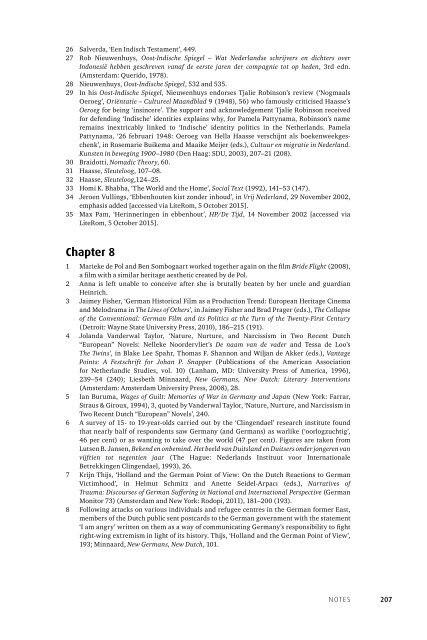Discord Consensus
7aze300jFJo
7aze300jFJo
Create successful ePaper yourself
Turn your PDF publications into a flip-book with our unique Google optimized e-Paper software.
26 Salverda, ‘Een Indisch Testament’, 449.<br />
27 Rob Nieuwenhuys, Oost-Indische Spiegel –Wat Nederlandse schrijvers en dichters over<br />
Indonesië hebben geschreven vanaf de eerste jaren der compagnie tot op heden, 3rd edn.<br />
(Amsterdam: Querido, 1978).<br />
28 Nieuwenhuys, Oost-Indische Spiegel, 532 and 535.<br />
29 In his Oost-Indische Spiegel, Nieuwenhuys endorses Tjalie Robinson’s review (‘Nogmaals<br />
Oeroeg’, Oriëntatie –Cultureel Maandblad 9 (1948), 56) who famously criticised Haasse’s<br />
Oeroeg for being ‘insincere’. The support and acknowledgement Tjalie Robinson received<br />
for defending ‘Indische’ identities explains why, for Pamela Pattynama, Robinson’s name<br />
remains inextricably linked to ‘Indische’ identity politics in the Netherlands. Pamela<br />
Pattynama, ‘26 februari 1948: Oeroeg van Hella Haasse verschijnt als boekenweekgeschenk’,<br />
in Rosemarie Buikema and Maaike Meijer (eds.), Cultuur en migratie in Nederland.<br />
Kunsten in beweging 1900–1980 (Den Haag: SDU, 2003), 207–21 (208).<br />
30 Braidotti, Nomadic Theory, 60.<br />
31 Haasse, Sleuteloog, 107–08.<br />
32 Haasse, Sleuteloog,124–25.<br />
33 Homi K. Bhabha, ‘The World and the Home’, Social Text (1992), 141–53 (147).<br />
34 Jeroen Vullings, ‘Ebbenhouten kist zonder inhoud’, in Vrij Nederland, 29 November 2002,<br />
emphasis added [accessed via LiteRom, 5 October 2015].<br />
35 Max Pam, ‘Herinneringen in ebbenhout’, HP/De Tijd, 14 November 2002 [accessed via<br />
LiteRom, 5 October 2015].<br />
Chapter 8<br />
1 Marieke de Pol and Ben Sombogaart worked together again on the film Bride Flight (2008),<br />
a film with a similar heritage aesthetic created by de Pol.<br />
2 Anna is left unable to conceive after she is brutally beaten by her uncle and guardian<br />
Heinrich.<br />
3 Jaimey Fisher, ‘German Historical Film as a Production Trend: European Heritage Cinema<br />
and Melodrama in The Lives of Others’, in Jaimey Fisher and Brad Prager (eds.), The Collapse<br />
of the Conventional: German Film and its Politics at the Turn of the Twenty-First Century<br />
(Detroit: Wayne State University Press, 2010), 186–215 (191).<br />
4 Jolanda Vanderwal Taylor, ‘Nature, Nurture, and Narcissism in Two Recent Dutch<br />
“European” Novels: Nelleke Noordervliet’s De naam van de vader and Tessa de Loo’s<br />
The Twins’, in Blake Lee Spahr, Thomas F. Shannon and Wiljan de Akker (eds.), Vantage<br />
Points: A Festschrift for Johan P. Snapper (Publications of the American Association<br />
for Netherlandic Studies, vol. 10) (Lanham, MD: University Press of America, 1996),<br />
239–54 (240); Liesbeth Minnaard, New Germans, New Dutch: Literary Interventions<br />
(Amsterdam: Amsterdam University Press, 2008), 28.<br />
5 Ian Buruma, Wages of Guilt: Memories of War in Germany and Japan (New York: Farrar,<br />
Straus & Giroux, 1994), 3, quoted by Vanderwal Taylor, ‘Nature, Nurture, and Narcissism in<br />
Two Recent Dutch “European” Novels’, 240.<br />
6 A survey of 15-to 19-year-olds carried out by the ‘Clingendael’ research institute found<br />
that nearly half of respondents saw Germany (and Germans) as warlike (‘oorlogzuchtig’,<br />
46 per cent) or as wanting to take over the world (47 per cent). Figures are taken from<br />
Lutsen B. Jansen, Bekend en onbemind. Het beeld van Duitsland en Duitsers onder jongeren van<br />
vijftien tot negentien jaar (The Hague: Nederlands Instituut voor Internationale<br />
Betrekkingen Clingendael, 1993), 26.<br />
7 Krijn Thijs, ‘Holland and the German Point of View: On the Dutch Reactions to German<br />
Victimhood’, in Helmut Schmitz and Anette Seidel-Arpacı (eds.), Narratives of<br />
Trauma: Discourses of German Suffering in National and International Perspective (German<br />
Monitor 73) (Amsterdam and New York: Rodopi, 2011), 181–200 (193).<br />
8 Following attacks on various individuals and refugee centres in the German former East,<br />
members of the Dutch public sent postcards to the German government with the statement<br />
‘I am angry’ written on them as a way of communicating Germany’s responsibility to fight<br />
right-wing extremism in light of its history. Thijs, ‘Holland and the German Point of View’,<br />
193; Minnaard, New Germans, New Dutch, 101.<br />
NOTES<br />
207


